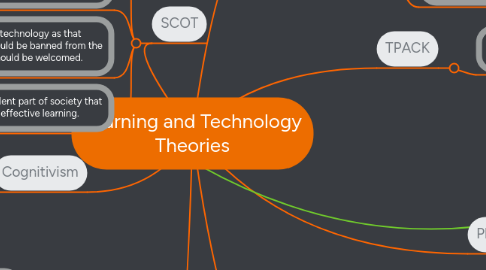Learning and Technology Theories
by Jordyn Hugill


1. Cognitivism
1.1. The process by which information is memorized in the brain (working memory, schema, long term memory).
1.2. Easier ways to remember things- pneumonic devices, silly phrases, rhymes etc.
1.3. This is important because we must realize that you can't remember everything for an hour long lecture.
1.4. We can come up with tools and tricks to aid students in the memorization of difficult topics or points.
2. SCOT
2.1. This is the Social Construction of Technology
2.2. The actions that we take shape technology, technology does not shape us.
2.3. We mustn't look at technology as that something that should be banned from the classroom, but it should be welcomed.
2.4. Technology is a prevalent part of society that we must embrace for effective learning.
3. Constructivism
3.1. Students taking control of their own learning and gaining knowledge through experience.
3.2. Teacher as the facilitator of learning, rather than a lecturer.
3.3. By using technology we as teachers can create learning that students can relate to and that they are interested in.
4. Connectivism
4.1. Adapting our learning theory for a "digital age" by being part of a learning network.
4.2. You are exposed to my different opinions, people and ideas through this theory.
4.3. You are constantly learning and gaining the most recent knowledge.
4.4. Students are able to learn in a variety of ways that we, as teachers, must be able to expose them to.
5. Behaviourism
5.1. This theory views the mind as a black box.
5.2. Uses principles such as positive and negative reinforcement to provoke a certain outcome.
5.3. Reward system- you do this and you get that.
5.4. Can be very helpful in classroom management, as well as in getting students to remember things or study.
6. TPACK
6.1. TPACK- A teachers balance of technology, pedagogy and content knowledge.
6.1.1. Technology- Being able to use a variety of technological devices as well as electronic resources (blogs, educational games, etc.) during lessons.
6.1.2. Pedagogy- Being able to teach and convey the knowledge that you have to your students.
6.1.3. Content Knowledge- Your knowledge of the topics that you are teaching. Knowing what the students need to know and having a firm understanding of that.
